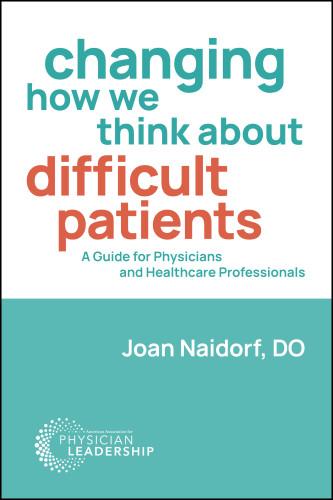Summary:
It is never too late to develop an idea into a lecture, an essay, or a book. My mission is to lessen the suffering around difficult patient interactions and to keep more of our colleagues practicing clinical medicine and nursing.
In January 2021, the American Association for Physician Leadership published my book Changing How We Think About Difficult Patients: A Guide for Doctors and Healthcare Professionals. I have learned a lot since then and I want to share a few thoughts.
It is never too late to develop an idea into a lecture, an essay, or a book. I took a lecture that I had written decades earlier and expanded it into a book after my friend Elaine suggested this notion to me as an aside. I was 62 and had never considered writing a book. But that’s what I did.
The book was released during the COVID-19 pandemic and before the release of the COVID-19 vaccines. Consequently, no in-person events were being held and most medical conferences were virtual. Therefore, I went about pitching myself and my book, to as many people and organizations as I could, one by one.
I published pieces related to the theme of the book — dealing with difficult patients — in various places, including the Washington Post, ACEP Now, and kevinmd.com. There were more than 500 online comments in response to the Washington Post piece in just the first three days.
I never read those comments because I know from previous experience that many people use them as an opportunity to air their personal grievances. I already know that the expression of my world view on this topic will not please everyone. People tend to mis-interpret the title of my work and take umbrage at being labeled difficult. This is precisely my point: they should not be labeled difficult.
One lady, I will call her Deborah, sent a lengthy handwritten note to my home address. She explained, in earnest, why after a traumatic experience of abuse at the hands of a medical professional, she became anxious and yes, difficult. As she is aware of her unique needs, she notifies all of her healthcare providers about her need to have a chaperone and open doorways. With communications and improved understanding, her requirements can be respected and met.
Deborah illustrated the very point that I try to illustrate in my lectures and writings on this topic: The fussy behavior or non-compliance in our patients or their families stems from the incorrect assumptions that we make about them and a general lack of curiosity on our part.
Why can’t Deborah be seen in a closed room? Why doesn’t Mrs. Jennings make her dialysis appointments? Why does Mr. Collins not take the medication as prescribed? There is a reason. To find out, doctors and nurses must ask.
Dr. Bob Singer, a retired family practitioner, sent me a lovely essay titled “Is Your Patient Non-Compliant? Or is Your Plan Incomplete?” I wish I had thought of this myself. He writes, "Non-compliance is a chance to listen to your patients, to seek more information, to find out what they really think about your advice. It is a chance to discover what your patients fear about your advice, what in their lives makes following your advice difficult, what values they have that preempt your plan. Believe it or not, your advice is usually not the highest priority in your patients’ lives. You need to find a way to fit your advice into the schedule and priorities of your patient. That is what it means to be patient-centered.”
I am encouraging Dr. Singer to publish his essay so that his message will reach more physicians.
I am eager to speak to groups of residents, nurses, and physicians at continuing medical education conferences. My mission is to lessen the suffering around difficult patient interactions and to keep more of our colleagues practicing clinical medicine and nursing.
The struggles in our country’s healthcare system fall inordinately on our healthcare workers. In the book, I wrote about the moral injury they suffer when they know that the systems or practices they are asked to perform are incorrect or not in the best interest of a sick or injured patient. Your nurses and physicians answer the call anyway.
It is natural for doctors and nurses to become defensive and judgmental toward the people who do not comply or who question our expertise or act out. We need to ask more questions. With more understanding and practice, we can change our thinking so that there are no difficult patients.
For non-medical folks who have a daughter, son, or nephew in the business who is struggling, the book would make an excellent gift. It is so difficult to watch the discouragement of young people who have sacrificed so much and worked for many years to achieve the goal of an advanced medical or nursing degree. There are some useful behavioral changes they can learn about.
For those of you who like to listen to your books, my book is now available in audio format narrated by a professional.
Topics
Judgment
Self-Control
Adaptability
Related
Get Off the Transformation TreadmillBeing Adaptable Isn’t Enough. You Have to Demonstrate It.Unlocking Leadership Potential: The Power of Executive Coaching with Vivek IyerRecommended Reading
Motivations and Thinking Style
Get Off the Transformation Treadmill
Motivations and Thinking Style
Being Adaptable Isn’t Enough. You Have to Demonstrate It.
Self-Management
Succeeding as an Outsider in a Legacy Culture
Professional Capabilities
Championing Physician Leadership Development: AAPL's Five-Decade Commitment Meets Healthcare's Critical Moment
Professional Capabilities
“Profiles in Success”: Certified Physician Executives Share the Value and ROI of their CPE Education



